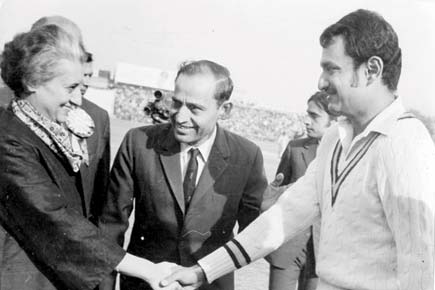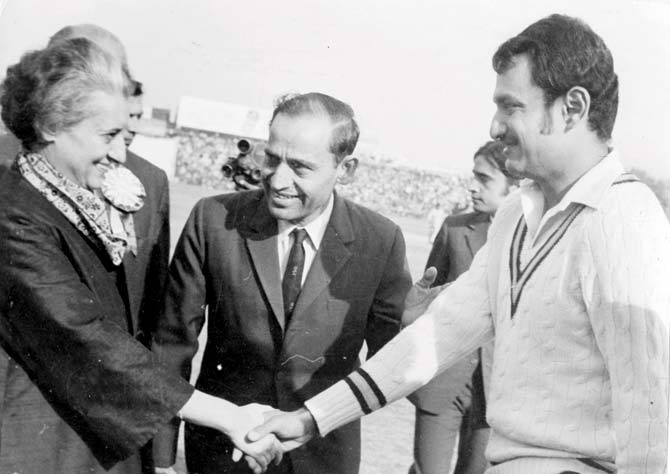Indian cricket teams have had all kinds of managers and recently appointed Sunil Subramanian will do well to emulate the good ones


Manager Hemu Adhikari (centre) introduces India captain Ajit Wadekar to PM Indira Gandhi during the New Delhi Test against England in 1972. Pic/MID-DAY Archives
ADVERTISEMENT
 Finally, the Board of Control for Cricket in India (BCCI) has roped in a full-time team manager. What took them so long to fill this gap, one wonders, but then, alacrity and Indian cricket are not the best of mates.
Finally, the Board of Control for Cricket in India (BCCI) has roped in a full-time team manager. What took them so long to fill this gap, one wonders, but then, alacrity and Indian cricket are not the best of mates.
That new manager Sunil Subramanian is a former first-class cricketer should help. Historically, team managers, media managers and baggage men have been an amusing lot and have contributed to cricketing folklore. Like Wing Commander Shahid Durrani, without whose intervention India could have lost the Melbourne Test of 1981. When Sunil Gavaskar took his opening partner Chetan Chauhan with him on being given out leg before wicket by umpire Rex Whitehead, the alert manager walked down swiftly and signalled to Chauhan to stay put on the turf as a raging Gavaskar walked towards the dressing room.
Ghulam Ahmed was manager during the Nari Contractor-led team's 1962 tour of the West Indies. In a Barbados hospital after Charlie Griffith fractured his skull, Contractor had vomited and the hospital staff failed to inform the doctor treating Contractor. Ahmed, who visited Contractor that evening, noticed the vomit, admonished the staff and ensured Dr Leacock arrived on time. Dr Leacock kept Contractor going by stopping the blood from flowing to the brain before the neurosurgeon arrived from Trinidad. Contractor says, "If I am living today, it's only because of Ghulam."
Some managers can be less sensible. Only the other day, a former India skipper told me about a manager who was so concerned about two players suffering from the flu on an England tour, that he reached out for a telephone directory to find an appropriate doctor. The players were sent to him, but the doctor turned out to be a gynaecologist!
One of the most famous Indian team managers was Colonel Hemu Adhikari, who accompanied Ajit Wadekar's teams to England in 1971 and 1974. Adhikari was a disciplinarian and frowned upon late nights. Players who were not afraid of stepping out to socialise, used to keep pillows under a blanket to hoodwink the Colonel in case he dropped in to check whether they were in bed. One night in 1971, a few players who dared return late, saw Adhikari in the bar, sipping his gin and tonic. Fortunately, he didn't notice them trooping in.
In 1975, the Board appointed former captain GS Ramchand to manage India's World Cup team in England. A dressing room brawl broke out between wicketkeeper Farokh Engineer and senior pro S Abid Ali during the luncheon interval in the India vs East Africa game at Leeds. Anshuman Gaekwad witnessed Engineer and Abid Ali threatening to throw their glasses of water at each other. "Ramchand was always very well dressed and I saw him in the centre of the dressing room with Abid and Farokh opposite each other, actually running for cover in the fear of his new suit getting messed up. It was hilarious," Gaekwad recalled.
In another decade, there was one particularly memorable team meeting before the start of a series. While the Indian team were discussing the strengths of the English team, the manager warned them that there was one opposition bowler who they should beware of. His name? David Gower. The elegant former England batsman had long-retired by then. The over-enthusiastic manager actually meant Darren Gough.
Some travelling officials can also get ahead of themselves. After an Indian overseas Test match win, a fellow journalist and I were chatting to the baggage-in-charge while the players were celebrating inside the dressing room. He soon began boasting that he too was part of the coaching set-up that contributed to India's win. We couldn't help chuckling.
In his tenure as India coach, John Wright encountered several tour and local managers. Not all of them were impressive, but Chetan Chauhan, the former India opener, who was appointed for the home series against Australia in 2001, had a good understanding with the then new India coach. Wright wrote in his book Indian Summers that Chauhan, "gave the players good messages – 'bat like you're the last man' – and I wish his appointment had been permanent."
Prof Ratnakar Shetty was another fine team manager and Wright appreciated his efforts on a difficult tour of Pakistan in 2004.
Journalists who were on India's 1997 tour of Sri Lanka [where the hosts piled up 952 at Colombo 20 Augusts ago], encountered a firm yet proactive tour manager in Shetty.
In previous years, countries like South Africa and Australia have had long-serving team managers in Goolam Rajah and Steve Bernard respectively. Rajah chucked his pharmacy business and became just what the doctor ordered for South African cricket in 1991. He served till 2011, while Steve Bernard, a former New South Wales fast bowler and Test selector, became manager in 1998 and stayed on till 2011.
It's unlikely that an Indian team manager will ever enjoy such longevity, but hopefully, ex-spinner Subramanian will maintain a good line and length on a pitch which can have some awkward bounce.
mid-day's group sports editor Clayton Murzello is a purist with an open stance. He tweets @ClaytonMurzello. Send your feedback to mailbag@mid-day.com
 Subscribe today by clicking the link and stay updated with the latest news!" Click here!
Subscribe today by clicking the link and stay updated with the latest news!" Click here!







